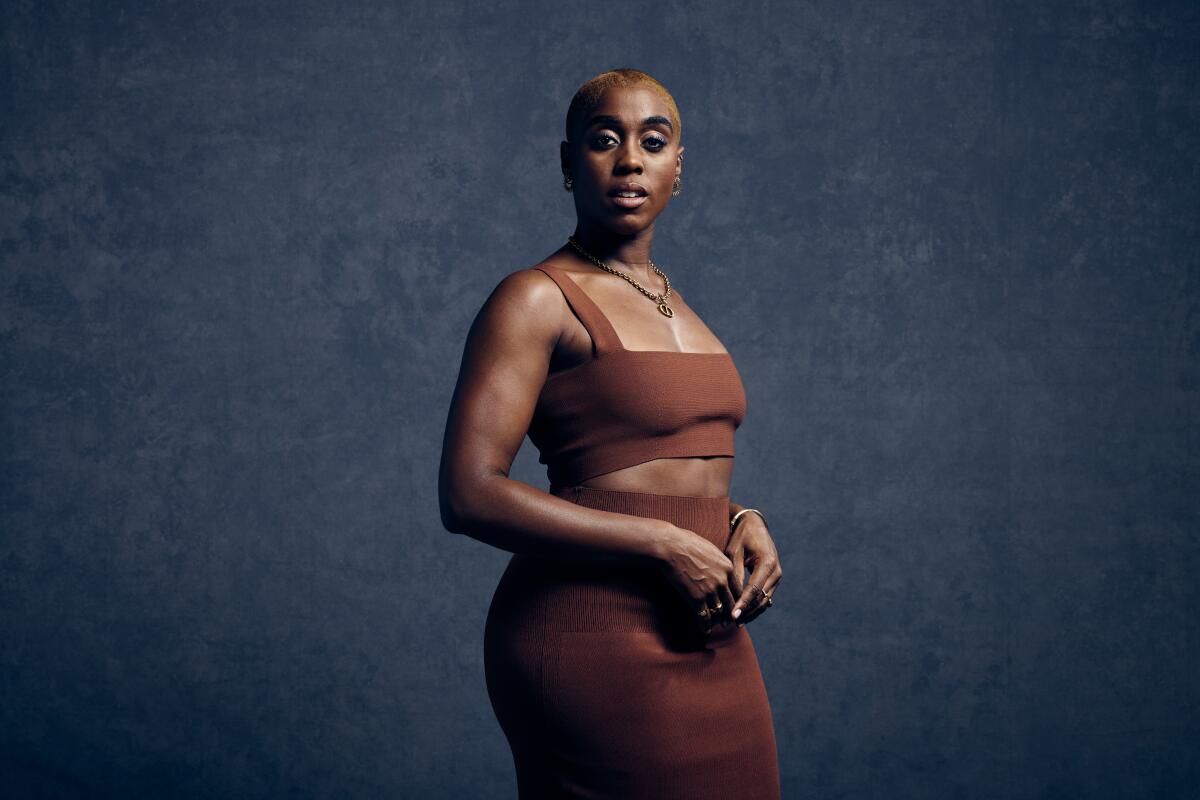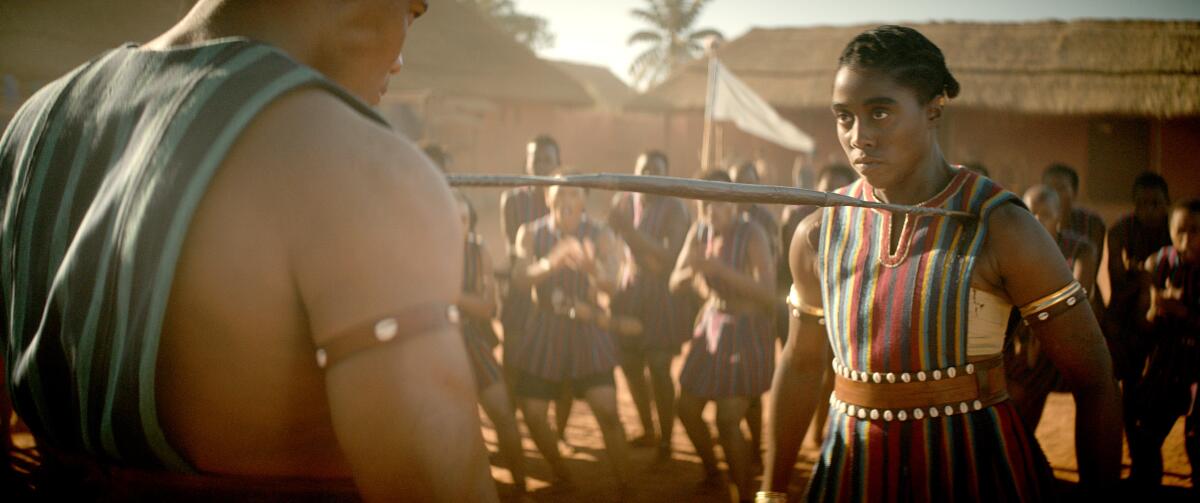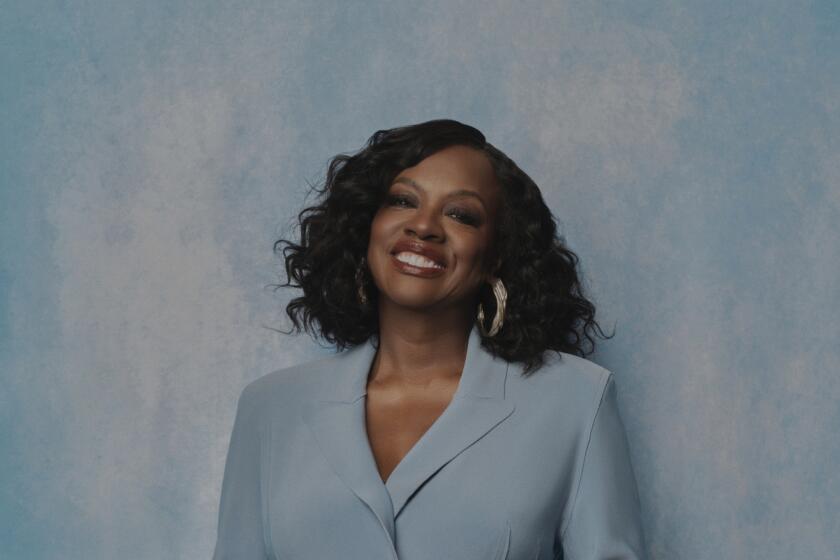Lashana Lynch finally lets it be known — she can sing (and fight)

It makes sense that Lashana Lynch felt like perfect casting to play Izogie, the machete-wielding bodyguard in Gina Prince-Bythewood’s historical epic “The Woman King.” Lynch’s filmography, after all, was already filled with physically demanding roles, from a pro fighter pilot in “Captain Marvel” to a gravity-defying superspy in “No Time to Die.” So the British actor was as surprised as anyone to learn what inspired Prince-Bythewood to tailor Izogie with Lynch in mind: “She saw me give a speech at the 2020 Essence Black Women in Hollywood Awards,” says Lynch. “She said, ‘I was impressed by who you are,’ which is wild. For a Black woman filmmaker that I’d admired since the beginning of her career, that was a special moment for me.”
In the end, though, 2022 also became the year that exemplified Lynch’s spectacular range. Stepping into the role of the wide-eyed schoolteacher Miss Honey in Matthew Warchus’ “Matilda the Musical,” Lynch shows she can also belt out a tune, go toe-to-toe with child actors and emit a kindly glow that lights up every room.
Talk about transitioning from playing a sensitive, singing educator to playing a fearless Agojie warrior.
I took the facts of both of them and tried to keep them in line as possible. They both care about young people. It’s their honor to serve them and ensure that they make the most out of their abilities. Also, when you’re reversing a feeling sometimes, if it’s a clean-cut reverse, then it can be pretty easy. Miss Honey is from the inside out meek, low confidence, low self-esteem. From the outside in, Izogie presents as very strong but has this deep vulnerability that she masks very well. One is on the surface cotton fleece and the other is just concealing it.

Because of your previous action roles, did you assume that training for “Woman King” would be a breeze?
Yes. And I was very quickly told I was wrong. Gina told me I was wrong. My trainer told me I was wrong. [laughs] It’s nice to have had some experience in stunts and physical work and have an athlete’s background, but what I had to put my body through before was nothing compared to this. This was me doing my own stunts entirely. I’m really competitive with myself. I wasn’t going to say, “Please get me a stunt double. I’m not going to rise to the challenge like everyone else.” We trained six days a week for four to five hours a day. Sometimes before work, sometimes after. Sometimes on Sundays. Always between takes. I nearly vomited so many times.
Did you know that Izogie would be a scene-stealer?
I knew that if I connected with her on this deep level that I did on set, that young girls would also. [Gina and I] were both in charge of this woman who we knew was going to be incredible. Gina was up for every single idea I threw out.
Give an example.
I wanted to be physically rough with Nawi [Thuso Mbedu], like an aggressive big sister who’d never let you have your way. I thought it’d be really fun to play. I sometimes took it too far, maybe smacked Thuso on her back too hard a couple of times. [laughs] Also I didn’t want every single moment to be serious. I wanted Izogie to enjoy her life. We don’t often get to see dark-skinned women on screen just having a good time.
The actor and her husband laugh together and work together. And together, they pushed through the historical action epic “The Woman King.”
When did “Woman King” training start?
The last two weeks of the “Matilda” shoot. So I was playing sweet Miss Honey until 6 p.m., then from 7 p.m. until 9:30, learning martial arts, which I’d never done before. I had a really interesting conversation with Matthew Warchus. He was like, “Can we not have you train too early? I just can’t have a bulky Miss Honey.”
True or false: Warchus was unaware of your beautiful voice until after you were cast.
No one knew what I sounded like. I even said to my agent, “Why are they asking me to come in?” I don’t think he’d seen my work. That didn’t make sense. They were absolutely taking a risk — which I’m really impressed by, actually. I love that someone just has a feeling. If someone is just moving on gut and believes that I can do it, then I don’t really care. He saw something in me that hadn’t yet been revealed. What was revealed was I’d been looking for Miss Honey for years and years.
Meaning?
I was deeply yearning [to play] someone who didn’t have it together. I’d never been given the opportunity — nor do many Black women — [to play a character] who struggles without it being a historical struggle. As a Black woman in this industry, I’m over saving the day. I’m over having to find a man to have a happy ending with. I just want to be.
I love being emotional, just letting it out. I wanted something complicated. And Miss Honey’s emotions are so unbelievably complicated. She gave me the opportunity to be someone figuring it out and failing at every single hurdle.
More to Read
From the Oscars to the Emmys.
Get the Envelope newsletter for exclusive awards season coverage, behind-the-scenes stories from the Envelope podcast and columnist Glenn Whipp’s must-read analysis.
You may occasionally receive promotional content from the Los Angeles Times.








